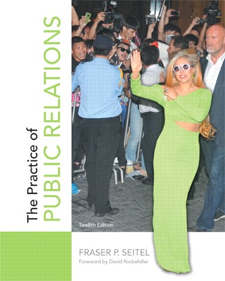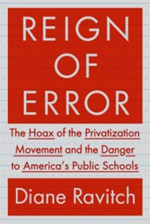PR exec Kate James, who is leaving the Gates Foundation to be chief corporate affairs officer at Pearson at the start of the year, will bring lots of controversy with her when she delivers the annual Distinguished Lecture to the Institute for PR Thursday at the Yale Club.
The IPR website does not mention that James has taken the job with Pearson, moving from a non-profit to a for-profit organization. IPR said it will make an announcement of this before James starts her talk Thursday.
 James |
Pearson is portrayed by PR Watch and others as a for-profit octopus that has its tentacles around practically aspect of U.S. education, reaping billions of dollars in revenues.
PRW cites instances of Pearson working with elements of the American Legislative Exchange Council, which PRW says is an organization of 2,000 mostly Republican state legislators and 300 corporate representatives that has an undue influence on state lawmaking. Only one Democrat is among 104 legislators in its leadership posts, it says.
PRW charges Pearson has undue influence on legislators and improperly funds trips abroad for educators.
The blog bigeducationape says, “In essence, every facet of our public educational system, from teacher preparation, curriculum design and content, and testing/assessments from womb to tomb are now owned by a private corporation whose profits skyrocketed into the billions of dollars.”
Pearson, with revenues of $8.29 billion, is called “the largest education company in the world” and the “largest book publisher in the world” by Wikipedia.
Its properties include the Financial Times Group; 47% of Penguin Random House; 50% of the Economist Group which includes The Economist magazine; Prentice-Hall; Connections Academy, which operates online classes in many states, and numerous education-related entities.
Pearson books are now being offered online as well as in print.
 Practice of PR 12th edition features Lady Gaga on its cover. |
James, a native of the U.K. who was chief communications office at the Gates Foundation since 2010, will speak on “The Business of Changing the World.” Her predecessor at Pearson, Luke Swanson, is currently leading the company's program to reorganize its businesses around its global education strategy.
Pearson said he is currently “leading the company’s program to reorganize its businesses around its global education strategy.”
Collins of NYT Raps Pearson
School testing has been turned into “a huge corporate profit center, led by Pearson,” New York Times columnist Gail Collins wrote on April 27, 2012. “An American child could go to a public school run by Pearson, studying from books produced by Pearson, while his or her progress is evaluated by Pearson standardized tests. The only public participant in the show would be the taxpayer.”
Collins’ essay, called “A Very Pricey Pineapple,” ridiculed a question on a Pearson exam for New York eighth graders that asked whether a pineapple or a hare would win a race. Forest animals ate the pineapple which was unable to move. State education commissioner John King had the question removed from the test.
Collins says Pearson lobbyists include the top White House liaison with Congress who was involved in drafting the “No Child Left Behind Act” in 2001 and that the Pearson’s non-profit foundation “sends state education commissioners on free trips overseas to contemplate school reform.”
Pearson Defends Trips
Pearson has answered such charges by saying the trips “make it possible for our nation’s education leaders to engage in an exchange with their international counterparts, share experiences, and come home armed with new strategies and ideas to raise achievement, especially achievement for our most struggling students.
“Regrettably, state and local education budgets could never provide the resources necessary for state chiefs and others to travel and collaborate in person with education ministers, reformers and innovators from Finland, Singapore, Brazil, or other nations who are more than willing to share their insights and best practices with us.”
This response was on the Pearson website after complaints were made that the Iowa education chief violated ethical codes by going on Pearson trips. NYT reporter Michael Winerip wrote an article headlined “Free Trips Raise Issues for Officials in Education” which focused on the Pearson trips.
PRW takes issue with corporate hosting of legislators at ALEC meetings.
It says that member companies cover hundreds or thousands of dollars worth of plane tickets for lawmakers and hotels for them and their families and this “raises serious concerns about such gifts under many states' ethics and lobbying laws.”
The spending is called a "scholarship" and filtered through a bank account designated as the "ALEC scholarship fund." This has enabled the donors to “maneuver around laws designed to limit improper influence,” says PRW, adding that watchdog groups like Common Cause, People for the American Way, Progress Now, and others are calling these practices into question.
The “No Child Left Behind Act” recalls a sorry chapter in PR’s history because it was revealed that the Dept. of Education hired Ketchum to promote the Act and Ketchum paid $240,000 to commentator Armstrong Williams to use his contacts and on-air appearances for that purpose.
A firestorm of coverage broke out that included a 3,000-word feature in the Sunday, Feb. 13, 2005 NYT by Tim O’Brien titled “Spinning Frenzy: PR’s Bad Press.” Numerous PR figures were quoted but no one would talk to O’Brien from either Ketchum or parent Omnicom.
Ravitch Battles School “Privatization”
Among those battling school “privatization” is Diane Ravitch , former U.S. Assistant Secretary of Education.
 |
An original supporter of “No Child Left Behind” and charter schools, she became disillusioned with the concepts and withdrew her support, saying "We are destroying our education system, blowing it up by these stupid policies. And handing the schools in low-income neighborhoods over to private entrepreneurs does not, in itself, improve them. There's plenty of evidence by now that the kids in those schools do no better, and it's simply a way of avoiding their - the public responsibility to provide good education."
There is extensive opposition in educational circles to the Gates approach to education which emphasizes online learning and testing. That students are not getting enough training in writing, is one criticism. PR Society of America’s accreditation test since 2003 has lacked any writing portion when it used to involve nearly a day of writing. A computer-based multiple-choice exam is given at facilities of Prometric, a unit of Thomson Corp. New PR Society APRs averaged 136 in the nine years ended June 30, 2012 vs. 274 in the previous ten years. The Society has yet to release the 10-year figures.
The Chronicle of Higher Education, in a series of stories, says Microsoft founder Bill Gates is using his money to find ways that students can complete their college educations quicker through technology.
Valerie Strauss, writing in the July 15, 2013 Washington Post, says “Gates has exercised extraordinary influence in shaping modern K-12 school reform to his liking, leveraging cash from his vast Microsoft fortune to drive the public agenda—and taxpayer funds—toward standardized test-based accountability.”
His vision includes “ways to measure everything, largely through testing,” writes Strauss.
The Gates Foundation has spent $472 million on higher education since 2006, says the Post.
PR Watch has detailed the close coordination of Pearson with the American Legislative Exchange Council. It portrays ALEC as a conservative group that impacts state laws but does not register as a lobbyist. Almost all state legislators who are members are Republicans.
Pearson Unit Aided ALEC
Mickey Revenaugh, co-founder and SVP of state relations of Connections Academy, a unit of Pearson, was “private sector” co-chair of ALEC’s Education Task Force from 2008 until May 2010, according to PRW.
PRW says ALEC has been in engaged for 20 years in an effort “to privatize public education through an ever-expanding network of school voucher systems which divert taxpayer dollars away from public to private schools.”
Allison Bazin, Connections’ senior director of PR, told PRW in July 2012 that the company withdrew from the ALEC Education Task Force in mid-May 2010 and no longer funds ALEC.
Collins said the $32 million that New York State was paying to Pearson was “small potatoes” compared to a five-year contact with Texas that is costing taxpayers “nearly a half-billion.”
Pearson’s contracts in Texas were discussed in one of the 15 responses wiredacademic.com received to an article titled, “Pearson draws criticism from New York to Texas…justified or unjustified?”
Teri Clifford, a kindergarten teacher in Fort Worth, wrote wiredacademic that she had e-mailed her concerns over the new standardized tests to members of the State Board of Education and received the following reply:
“I have no hesitation in telling you that as an educator myself and a member of the State Board of Education that I am opposed to the onerous testing that has totally consumed effective teaching and learning in our state.
“Also–and without hesitation–that the testing morass in which we are trapped is completely controlled by Pearson Publishing, the single company which publishes TAKS (Texas Assessment of Knowledge & Skills) and now STAAR/EOC (State of Texas Assessments of Academic Readiness). They own education in our state and, in many instances, the votes of members of the Texas Legislature. In the school year 2000/01 Pearson was paid, by the Texas’ taxpayer, 48 million dollars. Five years later, at the end of a five year contract, Pearson was paid 58 million dollars. That five year contract grossed Pearson 260 million dollars. Last school year–2010/11, Pearson was paid 91 million dollars.
“That was the year of budget cuts, teacher furloughs and facility closings. At the end of the current five year contract period, 2010-2015, Pearson will have realized a gross income of 469 million dollars. Pearson gets paid even if teachers do not.
“Follow the money and you will find where our education dollars go and who benefits the most from those dollars. You will not find teachers. You will not find students. You will not find parents. You will not find effective teaching and learning. You will find Pearson and legislators. I hope you do not mind my frank conversation.”
The writer of the e-mail was not identified.
Pearson Copes with Change
Motley Fool said Nov. 4 that Pearson “faces a continuing battle to keep up with changing educational and publishing trends,” placing its current share price of $21 at 15.4 times earnings. It says Pearson has “responded well” but that “there are more exciting growth opportunities out there.”
Pearson paid $650 million last year to acquire EmbanetCompass, which helps colleges to take their degree programs online. Embanet at the time had 35 university clients and Pearson had ten.


 AB InBev has hired Donna Lorenson as chief communications officer and elevated the PR function to the senior leadership structure in the aftermath of the Bud Light marketing disaster.
AB InBev has hired Donna Lorenson as chief communications officer and elevated the PR function to the senior leadership structure in the aftermath of the Bud Light marketing disaster. Tunheim handled the Minnesota USA World Expo bid committee, which on June 21 congratulated Serbia for landing the 2027 event.
Tunheim handled the Minnesota USA World Expo bid committee, which on June 21 congratulated Serbia for landing the 2027 event. United Minds, management consultancy, has launched Myriant, a business resiliency offering to help clients deal with the challenges during this era of misinformation, polarization and geopolitical upheaval.
United Minds, management consultancy, has launched Myriant, a business resiliency offering to help clients deal with the challenges during this era of misinformation, polarization and geopolitical upheaval.  ImageShield, which guards against online image abuse, is looking for a communications pro to handle its PR and marketing campaigns.
ImageShield, which guards against online image abuse, is looking for a communications pro to handle its PR and marketing campaigns. Who knew that there is a real paper company, Pennsylvania Paper & Supply, inside the iconic building seen at the opening of every episode of “The Office?”
Who knew that there is a real paper company, Pennsylvania Paper & Supply, inside the iconic building seen at the opening of every episode of “The Office?” 


 Have a comment? Send it to
Have a comment? Send it to 
No comments have been submitted for this story yet.